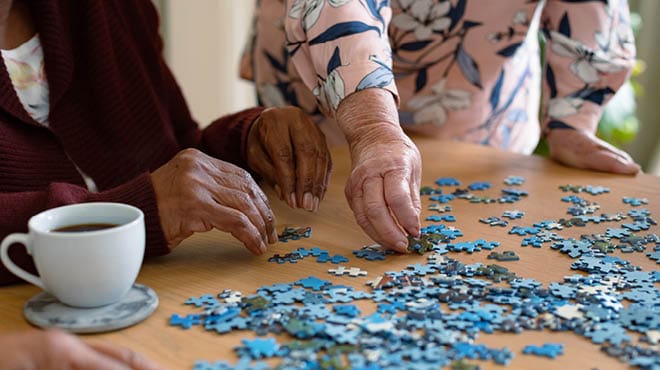Memory lapses: Normal aging or something more?

Have you ever walked into a room and forgot why you entered? Lost the name of an acquaintance you met a few years ago? Forgot the name of a tool in your shop?
Memory lapses and modest decline in thinking skills are common as you age. There's a difference, however, between normal changes in memory and memory loss associated with neurodegenerative conditions, such as Alzheimer's disease and Lewy body dementia. And some memory problems are the result of treatable conditions.
Memory continuum
Think of memory function as running on a continuum, with each person's memory and cognitive functioning falling somewhere along it. Some people have sharp memories and can recall even the smallest details, while others struggle to remember big events.
Memory changes can be viewed as movement along this continuum.
- Minor changes
Minor changes in memory as a person ages are considered normal. This includes misplacing reading glasses or occasionally having difficulty finding the right word. These situations are common and within the range of normal memory changes. These types of lapses don't interfere with daily life and aren't considered signs of dementia. - Mild cognitive impairment
This change is a larger movement along the memory continuum. Mild cognitive impairment occurs if a person is experiencing memory changes in addition to cognitive changes, such as thinking or reasoning skills. These changes are more than what is expected for the person's age but less than a person who is diagnosed with dementia. People with mild cognitive impairment can live alone, and the impairment does not significantly interfere with their daily lives. Symptoms could include short-term memory problems, repeating conversations and questions, and increased reliance on lists. However, people with mild cognitive impairment usually can manage their own finances, medications and household chores, and drive without concern.
For some people, mild cognitive impairment does not worsen. Their memory and function remain constant for the rest of their lives. For others, it is an early symptom of a neurodegenerative condition, such as Alzheimer's disease. Health care providers can't predict which people will remain constant and who will decline over time. - Dementia
Dementia is not a specific disease, but rather a group of symptoms that affects memory, thinking and social abilities severely enough to interfere with daily life. While dementia has a negative connotation, it really means that a person's brain function is impaired enough that the person cannot live alone and requires help with some daily tasks. Often, memory loss that disrupts daily life is one of the first or more recognizable signs of dementia.
Other early signs can include:
- Asking the same questions repeatedly.
- Forgetting common words when speaking.
- Mixing words up, such as saying "bed" instead of "table."
- Taking longer to complete familiar, simple tasks, such as operating a microwave or washing machine.
- Unable to perform complex tasks with many steps, such as following a recipe or playing a board game.
- Misplacing items in inappropriate places, such as putting a wallet in the refrigerator.
- Getting confused while walking or driving in a familiar area.
- Transposing numbers, such as when balancing a checkbook or dialing a telephone number.
- Limiting participation in conversations.
Causes of dementia
Some causes of dementia or dementia-like symptoms can be reversed with treatment. People with thyroid problems, problems absorbing vitamin B12, sleep apnea, hearing loss or hydrocephalus, or are experiencing side effects to medications, could develop dementia-like symptoms. A thorough medical assessment can determine the cause and if treatment will reverse symptoms.
Other causes of dementia are neurodegenerative, which is damage to, or loss of, nerve cells and their connections in the brain. This type of dementia cannot be reversed. Common causes include Alzheimer's disease, vascular dementia and Lewy body dementia.
What you can do
If you are concerned about your memory loss or the memory loss of a loved one, the first step is to schedule an appointment with a memory care expert. Alzheimer's disease and other neurodegenerative conditions cannot be diagnosed by completing a one-time memory test.
During a thorough evaluation, your health care provider will review all symptoms, medications and health history. Then your health care provider will rule out other factors that could worsen the symptoms. For example, a person may not be taking part in conversation or asking the same questions repeatedly because of significant hearing loss. Likewise, a person may be struggling with concentration because of chronic sleep apnea or depression.
After a dementia diagnosis, here are other things that caregivers can do to help:
- Encourage independence and purpose
Every person wants to contribute and feel purposeful. Often, family members want to take over tasks from their loved one after a dementia diagnosis. But families should try to keep their loved ones active and performing daily activities as long as they possibly can. You may need to modify the activity to allow your loved one to continue to contribute. For example, your loved one with dementia may be familiar with unloading the dishwasher but struggles with remembering where each item is stored. Labeling cabinet doors is an easy way to modify the activity, and this gives the person a sense of independence. - Foster social interaction
Research has shown that regular social interaction slows cognitive decline. However, when people start to have memory problems, they often pull back socially to avoid embarrassment. Schedule social time with a small, safe group who is familiar with the loved one's diagnosis. Then the person with dementia doesn't need to worry or feel self-conscious about repeating stories or asking questions. - Discuss preferences
Some people with dementia want to know if they have already asked a question or be gently reminded. This could agitate others. Ask the person with dementia which option is preferred and recognize that this could shift as conditions change. Identify a way to confirm that the person with dementia would like help. A simple nod or finger flick could signify that it is OK to lend support or assistance. - Create a predictable and soothing environment
Establishing and strengthening routine habits and minimizing memory-demanding tasks can make life easier for the person with dementia and the caregiver. Keep a loved one's keys, wallet and regularly used items in the same place. Label cabinet doors and write instructions for using appliances. Post a large calendar in a common area to track daily schedules and appointments. Remove excess clutter, while keeping photos and sentimental objects nearby, to create a restful environment. - Encourage exercise
Your loved one may not be able to run a marathon anymore, but regular movement improves blood flow, moderates mood and improves sleep. Gardening, walking and dancing are low-impact, safe activities for many people with dementia. - Plan healthy meals
People with dementia may forget to eat, lose interest in preparing meals or not eat a healthy combination of foods. Plan nutritionally dense meals that are rich in fruits, vegetables, whole grains and legumes, fish, healthier fats, and herbs or seeds so that every calorie is beneficial.
Kari Mongeon Wahlen is clinical nurse specialist in Neurology in Mankato, Minnesota.



